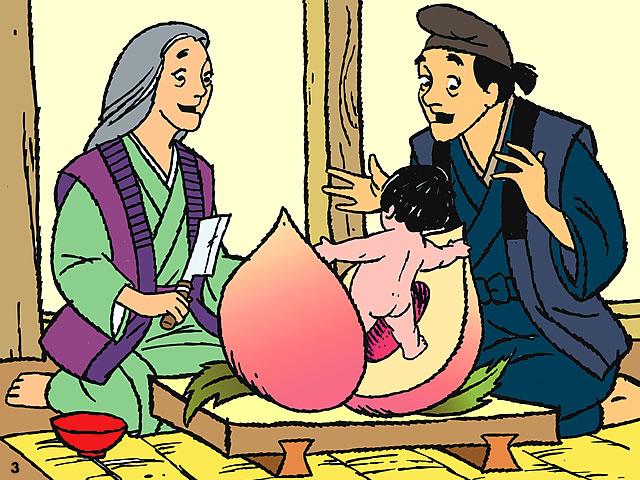Title: Momo-Taro (桃太郎) “Peach Boy”
General Information about Item:
- Genre and Sub Genre: Verbal Folklore: Children’s Folktale
- Type of Folktale: Wonder Tale (Fairy Tale)
- Language: Japanese
- Country where Item is from: Japan
Informant Data:
- Nashe Mutenda was born in Tokyo, Japan on September. Her mother was born in Sri Lanka and her father was born in Zimbabwe. They met at University in Japan and got married soon afterwards. While Nashe’s parents identify as Christians, she is not a practicing Christian. Nashe’s mother is a teacher, and her father works for an American Investment Bank. She has lived in Tokyo all of her life except for first grade, when she lived in Dallas, Texas. She is currently a freshman at Dartmouth College.
Contextual Data:
- Social/Cultural Context: Nashe was interviewed alone in Baker Library at Dartmouth College. She learned this folktale in preschool in Tokyo, Japan.
Item:
昔、昔あるところにおじいさんとおばあさんがいました。おじいさんは山へ芝刈りに、おばあさんは川へ洗濯に行きました。おばあさんが川で洗濯をしているとドンブラコッコ、ドンブラコと川から大きな桃が流れてきました。
おばあさんはその桃を家に持ち帰りました。桃を食べようと割ったところ桃の中から元気な男の子が飛び出しました。子供がいなかったおじいさん、おばあさんは大変喜んで桃から生まれた男の子を桃太郎と名付け、大事に育てました。
大きく成長した桃太郎は鬼ヶ島へ鬼退治に行くことになりました。おばあさんが作ってくれたきびだんごを腰にぶら下げ鬼ヶ島へと出発しましたが道中、イヌ、サル、キジ、が順番に現れ、きびだんごを欲しがります。桃太郎は鬼ヶ島へ同行することを条件にきびだんごを分け与えます。イヌ、サル、キジの三匹は桃太郎の家来となり船で鬼ヶ島へと向かいます。
鬼ヶ島では鬼たちが酒盛りの真っ最中で奇襲を仕掛けた桃太郎と三匹の家来は大勝利。鬼が悪行を重ねて集めた宝物を台車でひき、村へと持ち帰りました。
Associated file (a video, audio, or image file):
Transcript of Associated File:
English Word-Word Translation:
Old, old times some place grandpa and grandma lived. Grandpa mountain cut grass, grandma river laundry go. Grandma river washing when float, float river big peach flowing.
Grandma that peach home take. Peach try to eat break when peach inside healthy boy jumps out. Child none grandpa, grandma very happy peach born boy Momo-taro name preciously nurture.
Big grow Momo-taro Onigashima (Oni-island) go exterminate Oni (ogres) to go. Grandma made sweet dumpling waist hang Onigashima departure on the way, dog, monkey, pheasant order appear, sweet dumpling want. Momo-taro Onigashima accompany requirement sweet dumpling share. Dog, monkey, pheasant three Momo-taro servant become ship Onigashima head. Onigashima at Oni drinking midst raid wage Momotaro and three servants huge victory. Oni wrongdoing repeat gather treasure push car pull, village bring back.
English Interpretation:
A long, long time ago, there lived an old couple. The old man went to the mountains to cut grass and the old woman took some clothes to the river to wash. As she was washing her clothes, a big peach came floating down the river.
The old woman took this peach home. When the couple tried to eat the peach and broke it in half, out stepped a healthy young boy. The couple did not have a child and thus, were exhilarated. They named the boy who was born from a peach, Momo-taro and took good care of him.
When Momo-taro grew older, it was decided that he would venture to Onigashima to defeat the Onis (ogres). He departed with the bag of sweet dumplings his mother had given him around his waist. However, on the road he was stopped by a dog, a monkey, and a pheasant who all wanted the sweet dumpling. Momotaro gave them his sweet dumplings in exchange for their service during his journey to Onigashima. Thus, the dog, monkey, and pheasant became Momotaro’s servants and they set sail to Onigashima.
At Onigashima, the Onis were in the midst of drinking and celebrating. Momotaro and his three servants waged a surprise attack and emerged victorious. They brought back the treasures that the Onis had amassed through wrongdoings to their village.
Informant’s Comments:
- The informant spoke about how prominent this folktale was in Japanese media. She said that both news and commercials often reference “Peach Boy.”
Collector’s Comments:
- Applicable Laws of Folk narrative (Orlik)
- Law of Opening and Closing: This story does not begin with a sudden action
- Law of Initial and Final Position: The story begins in ends in the same place
- Concentration on Leading Character: The main focus is on Momo-taro
- Law of Three: Momo-taro’s servants appear in a group of three
- Propp’s Functions
- Departure: Momo-taro left for Onigashima to defeat the Onis
- First Donor Function (trebled): Momo-taro encounters a dog, a monkey, and a pheasant who all wanted the sweet dumpling.
- Hero’s Reaction: He gives a dumpling to each of the animals.
- Receipt of Agent: The animals become Momo-taro’s servants and accompany him on his journey.
- Struggle: Momotaro and his three servants waged a surprise attack.
- Victory: Momotaro and his servants emerged victorious.
- Return: Momotaro and the servants returned home.
- Wedding: Momotaro and the servants brought treasures back home.
- Dramatis Personae
- Hero: Momotaro
- Villain: Onis (Ogres)
- First Donor(s): Dog, monkey, and pheasant
- Magical Agent: None
- Dispatcher: None
- Princess: None
- The False Hero: None
- Similarities with Russian Folk Tale:
There are many similarities between Momo-taro and Russian folk tales that we have studied in class. Propp’s functions were very evident in this Japanese folktale. While some main functions were missing (such as absentation and interdiction), the order the functions that were in the tail was preserved. Additionally, many of the characters in this folktale fulfilled the Dramatis Personae.
- Differences with Russian Folk Tale:
Some key functions were missing from this Japanese folktale. Additionally, there were very few characters in this Japanese folktale that aligned with characters normally present in Russian folktales’ plots. Additionally, this folktale had a slightly different feel from most Russian Folk tales we’ve studied in class. Momo-taro seems more one-dimensional, as the hero does not develop or grow at all as a person. In most of the folktales we’ve studied, the hero develops (usually after failing to respond adequately to a First Donor).
Collector’s Name: Annaka Balch
Tags/Keywords: Japanese Folktale, Children’s folktale, Peach Boy, Momo-taro, Children

